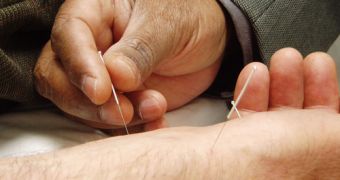New scientific research, conducted in the United States, revealed that in 4,000 cases of people suffering from chronic headaches, migraines, and other similar conditions, acupuncture actually worked better than an aspirin in alleviating pain. The team of researchers, based at Duke University, analyzed the effects of one of the oldest forms of medicine, which uses very thin needles to stimulate specific points under the skin, which in turn help the body regenerate.
When it was first introduced to the Western world, acupuncture seemed a trick-type medicine, and no one recognized the potential it had. Now, centuries later, inserting acupuncture into common medical practices is already a habit, and even the National Institutes of Health admit that, although energy meridians, the basis of Traditional Chinese Medicine (TCM), have no known anatomical or histological basis, they nevertheless exist, and their potential to heal must be tapped if possible.
"Acupuncture is becoming a favorable option for a variety of purposes, ranging from enhancing fertility to decreasing post-operative pain, because people experience significantly fewer side effects and it can be less expensive than other options," said the lead author of the new study, Dr. Tong Joo Gan. If performed professionally, acupuncture rarely has any side-effect, as thousands of years of perfecting the ancient art led to the creation of very elaborate books, which offer invaluable guidelines.
"One of the barriers to treatment with acupuncture is getting people to understand that while needles are used, it is not a painful experience. It is a method for releasing your body's own natural painkillers," Gan added.
During the study, participants were split into three groups – one that received regular drugs, one that benefited from true acupuncture, and one that was inserted needles into the skin, but in harmless spots. The respective therapies worked for 45 percent of people taking drugs such as aspirin, who reported a decrease in their pain levels, for 62 percent of those who received real acupuncture, who reported the pain gone, and for 45 percent of those in the control group.
Because of its reliability, acupuncture is now starting to be used more and more frequently in various modern hospitals throughout the world, where doctors understand its tremendous potential. Unfortunately for patients, there are still those who do not believe in what acupuncture can do, and they deprive their patients of an excellent source of health.

 14 DAY TRIAL //
14 DAY TRIAL //